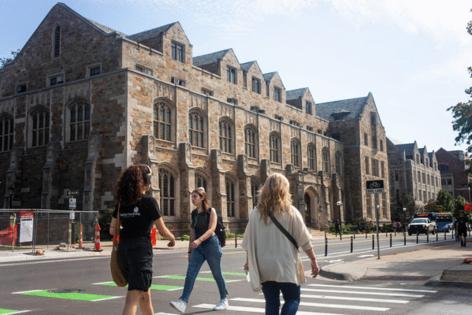Chinese scholar at UM tried to smuggle biological pathogen into the US, feds say
Published in News & Features
DETROIT — Federal agents have arrested a University of Michigan scholar from China on charges she tried to smuggle a biological pathogen into the U.S. characterized as a potential agricultural terrorism weapon that can be used for targeting food crops.
The FBI counterintelligence case against UM scholar Yunqing Jian, 33, and her boyfriend, 34-year-old Zunyong Liu, was unsealed in federal court in Detroit on Tuesday and marks the second time in less than a week a Chinese national with ties to the university has been charged with federal crimes.
On Friday, prosecutors unsealed a criminal case against a former University of Michigan Chinese student who voted illegally in the 2024 election, saying he fled the U.S. to avoid prosecution.
Jian is a citizen of China who received a doctorate degree in plant pathogens from Zhejiang University and investigators say they have discovered information describing her membership in and loyalty to the Chinese Communist Party. Prosecutors say she received money from a Chinese foundation funded largely by the Chinese government to conduct post-doctoral work, including research on a fungus known as Fusarium graminearum, a biological pathogen that can cause devastating diseases in crops.
Prosecutors say her boyfriend illegally smuggled a biological pathogen into the U.S. at the Detroit Metropolitan Airport on July 27.
"When Customs and Border Protection officers questioned Liu, he made false statements to CBP officers about the purpose of his visit to the United States, and his knowledge of the existence of the biological pathogen in his possession," an FBI special agent wrote in the criminal filing.
"Ultimately, Liu admitted to smuggling the pathogen and stated that he brought the pathogen into the United States so that he could conduct research on it at a laboratory at the University of Michigan where his girlfriend, Jian, worked," the agent added.
Fusarium graminearum is a strain of a plant pathogen that causes “head blight,” according to the criminal case, a disease that can devastate wheat, barley, maize, and rice.
"Fusarium graminearum is responsible for billions of dollars in economic losses worldwide each year," the agent wrote. Toxins produced by Fusarium graminearum cause vomiting, liver damage, and reproductive defects in livestock and humans, according to the complaint.
“The alleged actions of these Chinese nationals — including a loyal member of the Chinese Communist Party — are of the gravest national security concerns," interim U.S. Attorney Jerome Gorgon said in a statement. "These two aliens have been charged with smuggling a fungus that has been described as a ‘potential agroterrorism weapon’ into the heartland of America, where they apparently intended to use a University of Michigan laboratory to further their scheme.”
The court filing cites the journal Food Security, which noted Fusarium graminearum is classified as a potential agroterrorism weapon that could be used for targeting food crops.
Jian and her boyfriend are charged with several crimes, including conspiracy to defraud the U.S., smuggling, making false statements to investigators and visa fraud.
Jian is expected to make a brief appearance in federal court Tuesday afternoon. Her boyfriend has returned to China.
The roots of the case stretch to March 2024. That is when Liu applied for a B2 tourist visa to enter the U.S.
The application asked: Do you seek to engage in espionage, sabotage, export control violations or any other illegal activity while in the United States?”
Liu answered “no” and officials approved his tourist visa.
He arrived at Detroit Metro four months later, in July 2024.
During inspection, an officer found a hidden note in Chinese, a round piece of filter paper and four baggies filled with small clumps of reddish plant material, the FBI agent wrote.
Liu lied when asked questions about the materials, according to the court filing, saying someone “must have put them into his bag.”
“After further questioning, Liu acknowledged that the materials were different strains of the pathogen Fusarium graminearum,” the agent wrote.
Liu told investigators he planned to clone the different strains and make more samples if the experiments on the reddish plant material failed, according to the government.
“Liu stated that he intentionally hid the samples in his backpack because he knew there were restrictions on the importation of the materials,” the agent wrote. “Liu confirmed that he had intentionally put the samples in a wad of tissues so CBP officers would be less likely to find and confiscate them, and he could continue his research in the United States.”
---------------
©2025 www.detroitnews.com. Visit at detroitnews.com. Distributed by Tribune Content Agency, LLC.







Comments